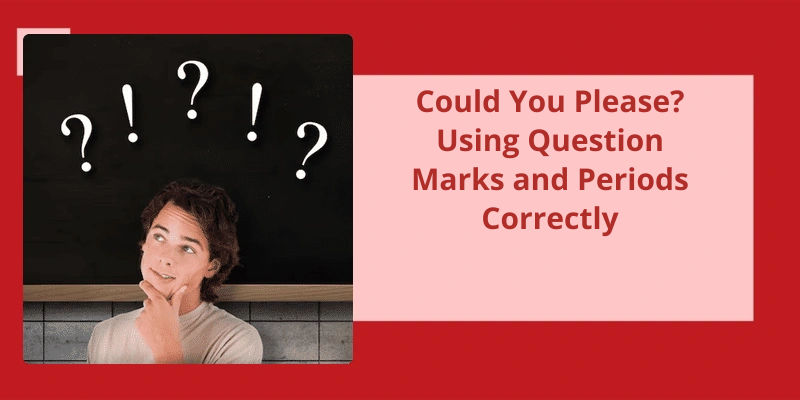Effective communication is a cornerstone of human interaction, and it’s crucial to understand the nuances of language in order to convey messages successfully. Whether in personal or professional settings, knowing when to use a question mark versus a period can make all the difference in the response that one receives. While a question mark is suitable for requests or favors that may be unattainable or unwanted, a period signals that compliance is expected from the recipient when addressing someone who reports to you. By being mindful of punctuation in your written communication, you can convey your message with clarity and precision, and achieve the desired outcomes.
Can You Use a Period Instead of a Question Mark?
The use of punctuation marks is crucial in communication. They make it possible to convey meaning, tone, and intention in written language. However, there are some punctuation rules, such as the use of a question mark and a period, that can be confusing.
This is because indirect questions aren’t meant to be answered with a yes or no response. Instead, they provide information and require no response. For example, you can use a period instead of a question mark when stating an opinion or making a statement that leaves no room for debate or response.
Indirect questions that end with a period may seem more declarative than interrogative. This means that the speaker isn’t looking for an answer but rather making a statement. This can be useful in situations where the speaker wants to express a thought or idea without inviting further discussion.
However, when asking direct questions, it’s crucial to use a question mark. This is because a question mark signals that the speaker is inviting a response from the listener. It allows the listener to know that they’re being asked a question and should respond accordingly.
For instance, the sentence “Are you going to the party?” has a different meaning from “You’re going to the party.”. The first sentence is a direct question, while the second statement is a declarative statement. The use of a question mark at the end of the first sentence indicates that the speaker is seeking information. On the other hand, the use of a period at the end of the second statement indicates that the speaker is making an observation.
While indirect questions can end with a period, direct questions require a question mark. Thus, it’s crucial always to use the correct punctuation to avoid confusion or miscommunication.
Examples of Indirect Questions That Can End With a Period.
There are certain types of questions that can be phrased indirectly and still end with a period. These types of questions usually don’t require a direct answer and are often used more to make a statement or suggestion. Examples could include questions like “I wonder where the restroom is,” or “Do you think it’s going to rain today?” with the tone of the sentence indicating that a response isn’t expected.
Now that we’ve established the proper punctuation for asking questions, let’s delve into another aspect of questioning etiquette: how long should you wait for a response from your friends?
Can You Ask a Question With a Period?
The idea of asking a question with a period is a bit of a misnomer. In most cases, you should always end your questions with a question mark. While some might argue that using a period can make your query sound more forceful or declarative, doing so can actually create confusion or ambiguity for your listener or reader.
It’s worth noting, however, that there are some cases where ending a sentence with a period can still convey a question. This is typically seen in reported speech, where someone is recounting a conversation they’d with another person. For example, “She asked me if I’d seen John.”. Even though this statement technically asks a question, it’s written with a period because it’s being reported after the fact.
When it comes to giving your friends time to answer a question, there are a few different factors at play. Depending on the context and the specific question youre asking, you may need to factor in things like the complexity of the question, the knowledge or experience your friend has with the topic, and the overall urgency of the situation.
In general, it’s a good idea to give your friends some time to think about what youve asked before expecting an answer. This is especially true if youre asking a more complex or open-ended question that might require some reflection or thought. Depending on the situation, you might give your friend a few seconds, a few minutes, or even longer to come up with a response.
Of course, there are also situations where time is of the essence and you need an answer quickly. In these cases, it’s important to communicate clearly with your friend about the urgency of the situation and the specific information you need from them. By setting clear expectations and being specific about what youre looking for, you can help your friend understand whats needed and respond accordingly.
Ultimately, the key to asking questions and getting answers is to be clear, concise, and patient. Whether youre ending your questions with a question mark or a period, giving your friends the time they need to think and respond can help ensure that youre getting the information you need and building stronger relationships in the process.
Source: Is it always incorrect to end a question with a period in writing?
As you can see, periods have a variety of uses in the English language. One common question people have is whether or not it’s acceptable to use a period at the end of a question. While it may seem counterintuitive, there are actually situations where using a period is appropriate. Let’s explore this further.
Can You Write a Question With a Period?
The use of a period at the end of a question can be a bit confusing for some people. The truth is that a question with a period is actually an indirect question. This means that instead of asking the question directly, you’re reporting or quoting someone elses question.
For instance, if you say, “She asked me if I like cats.” you’re quoting the question that was asked indirectly. The purpose of this is to indicate that the sentence isn’t a direct question but still contains a question.
In some cases, polite requests can be followed by either a period or a question mark. For example, if you say, “Can you pass me the salt?” you’re asking a question but using a polite tone. You can also choose to use a period and say, “Please pass me the salt.”. Both these phrases would be considered grammatically correct.
While it may seem like a small detail, using a period or question mark correctly can make a big difference in how your sentence is interpreted. A simple mistake can change the entire meaning of a sentence.
It all depends on the context of the sentence and whether or not youre quoting someone elses question.
Understanding the proper use of punctuation is vital when it comes to effective writing. While it may seem like a small detail, placing a punctuation mark incorrectly can completely alter the meaning of a sentence. In this article, we will explore the rules surrounding the use of question marks in sentences.
Do You Put a Question Mark in the Middle of a Sentence?
In English grammar, a question mark is used at the end of a sentence or phrase that’s a question. It indicates that the speaker is seeking information or confirmation about something. This would be in cases where the sentence is a direct question or a quoted question. For example, “Did you hear him ask, What time is it?” would have a question mark in the middle of the sentence.
In most cases, placing a question mark in the middle of a sentence can be considered incorrect usage. This is because the sentence isn’t a direct question, and it may confuse readers or cause them to misinterpret the meaning of the sentence. Instead, it’s advisable to use appropriate punctuation, such as commas or dashes, to separate different clauses or phrases within a sentence.
One exception to this rule may be in cases where the sentence is written in a more informal or conversational tone. In this case, a writer may choose to use a question mark in the middle of a sentence for emphasis or to convey a certain tone or mood. However, this should be done sparingly and with caution, as it can be seen as unprofessional or incorrect in most situations.
Conclusion
In conclusion, punctuation plays an important role in written communication. While question marks are appropriate when requesting a favor or asking a question that may be denied, periods are suitable when addressing subordinates who’re expected to comply. The proper use of punctuation can enhance the clarity of your message and avoid misunderstandings. Ultimately, communication is key, and the appropriate use of punctuation can make all the difference between a successful exchange and a miscommunication.






